May 25, 2021 - Politics & Policy
Trump claims he has "absolute immunity" from Swalwell lawsuit
Add Axios as your preferred source to
see more of our stories on Google.

Photo: Joe Raedle/Getty Images
Add Axios as your preferred source to
see more of our stories on Google.

Photo: Joe Raedle/Getty Images